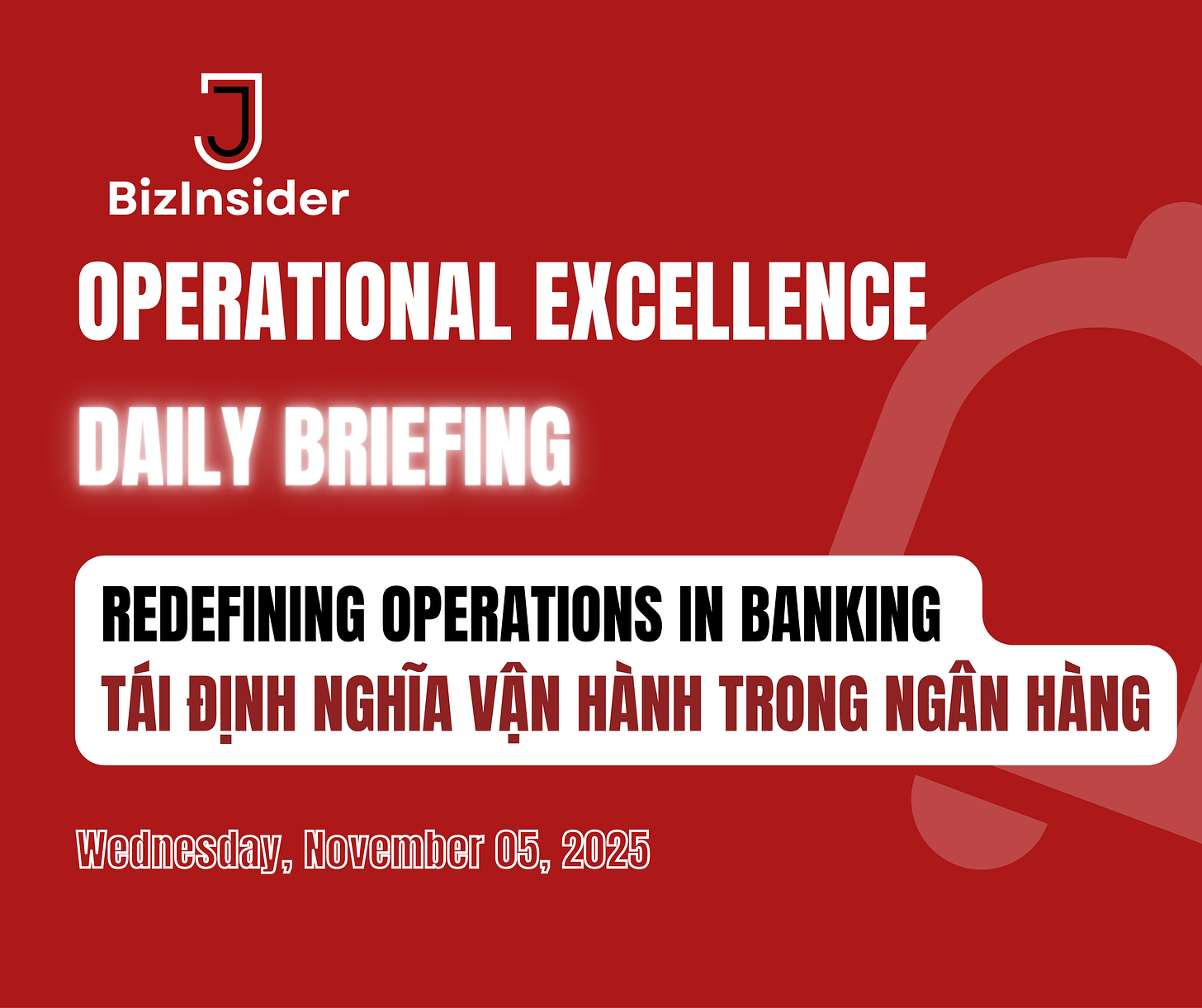Operational Excellence (OPEX) Daily Briefing – Wednesday, November 05, 2025: Redefining Operations in Banking: How Bank of America Turns Processes into Strategy.
Điểm Tin Operational Excellence (OPEX) Mỗi Ngày – Thứ Tư, Ngày 05/11/2025: Tái Định Nghĩa Vận Hành Trong Ngân Hàng: Cách Bank of America Biến Quy Trình Thành Chiến Lược
Welcome to my unique weekday article for the paid subscriber-only edition.
Operational Excellence (OPEX) Daily Briefing – issued on weekdays (Monday to Friday).
Điểm tin Operational Excellence (OPEX) hằng ngày (phát hành các ngày thứ Hai đến thứ Sáu).
This is the bilingual post in English and Vietnamese. Vietnamese is below.
Đây là bài viết song ngữ Anh-Việt. Tiếng Việt ở bên dưới.
English
Part 1: Official Statement – When Process Becomes Strategy: The Story from Bank of America
On November 5, 2025, Bank of America (BoA)—one of the world’s leading financial institutions—held its 2025 Investor Day, an event that drew special attention from the global financial community. This marked the first time in over a decade that BoA reopened this strategic forum since 2011.
According to Reuters and Barron’s, the event focused on presenting the bank’s growth direction, operational efficiency, and long-term technology investments. Notably, in a session titled “Enterprise Platforms: Payments, Technology, Operations, Digital & Marketing,” Jeff Busconi, Head of Corporate Strategy & Operational Excellence, took the lead.
Through the lens of Operational Excellence (OPEX), this may reflect a strategic model shift: BoA appears to be repositioning operations and technology from a supporting function to the core driver of growth and enterprise value.
1. When Operations Become Part of the Growth Strategy
For many years, operations within the banking sector were viewed as the “static” part of the organization—responsible for maintaining stability, compliance, and transaction processing.
But as the world entered 2025, the context has shifted dramatically.
According to Reuters, BoA is placing a new emphasis on enhancing operational efficiency, expanding payment platforms, and developing technological infrastructure to serve global customers.
This is not merely a cost-cutting effort, but rather a comprehensive restructuring of how the bank creates value—where operational processes and technology platforms play a central role in every strategic decision.
From an OPEX perspective, this indicates that BoA may be entering a mature stage of performance management, where operations are no longer just supporting business, but generating new competitive advantages.
2. Enterprise Platforms – The Shift from Structure to Integrated Systems
According to materials published on Bank of America’s official website, the “Enterprise Platforms” segment includes five key pillars: Payments, Technology, Operations, Digital, and Marketing.
This marks one of the rare occasions where BoA publicly presented these five elements as part of one strategic platform, reflecting a mindset of integrated, cross-functional operations.
Under the OPEX lens, this could represent an effort to build a system where data, processes, and people are fully synchronized, in which:
• Operational processes are directly aligned with business strategy;
• Data and technology accelerate real-time decision-making;
• And managers can monitor performance continuously, rather than waiting for end-of-quarter reports.
This model mirrors a global trend—financial institutions worldwide are being forced to connect every operational layer to sustain speed, accuracy, and compliance in increasingly complex regulatory environments.
3. Industry Context – When Operations Become a Competitive Capability
In 2025, the entire banking industry is undergoing a major wave of operational transformation.
According to Financial Times and Reuters, over 70% of major banks in the U.S. and Europe are in the process of modernizing their operational and technological platforms, with objectives that include:
• Accelerating transaction processing,
• Reducing operating costs, and
• Enhancing customer experience through automation and digitalization.
Within this landscape, BoA stands out for merging operational strategy and growth strategy into a single, unified direction.
From an OPEX viewpoint, this can be seen as the hallmark of a “mature operating organization”, where efficiency is not a byproduct, but a strategic objective in itself.
4. When Operational Excellence Enters the Boardroom
The fact that a senior executive holding the title “Head of Operational Excellence” led a main presentation at Investor Day marks a significant shift in BoA’s corporate governance structure.
Traditionally, investor presentations revolved around financials, profitability, or market positioning.
This time, however, operations—long seen as a silent backbone—took center stage in the conversation with investors.
Under the OPEX framework, this could signal that BoA now views operational efficiency as the common language uniting finance, technology, and people.
It represents a strategic elevation of operations—no longer a backstage function, but a core narrative in shareholder value creation.
5. Strategic Implications – When Process Becomes a Source of Competitive Advantage
From the verified information available, BoA appears to be implementing a systemic transformation:
shifting from a traditional financial institution to a data-driven, technology-enabled, and process-integrated enterprise.
Through the OPEX lens, this reflects a profound realization:
“In the digital era, process is not merely a tool to execute strategy—it is the strategy.”
BoA is demonstrating that in modern banking, operational excellence is not just a way to survive—but a way to lead.
Its 2025 Investor Day was not simply a meeting with investors—it was a strategic declaration of how operations have become the foundation of enterprise growth.
From an Operational Excellence perspective, this case may exemplify a global shift—where organizations are not only digitizing products but digitizing their decision-making and operational systems themselves.




